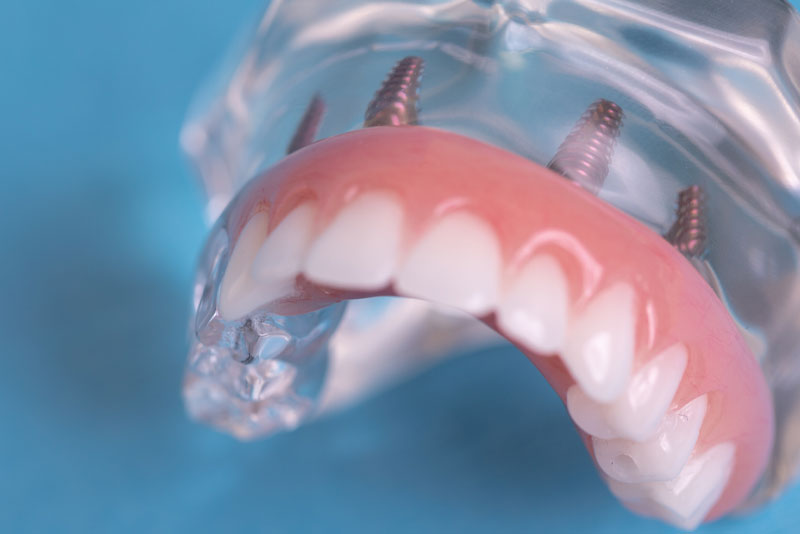
If you are experiencing multiple missing teeth or are completely without teeth, full arch dental implants solutions may be a great solution to restore your smile, oral health, oral function, and may renew your self-confidence. A doctor in Omaha, NE can guide you in the right direction of choosing which option is best for you.
Dental Implants vs Dentures
Dentures
Typically in the past, if a patient had multiple missing teeth, a dentist in Omaha, NE would recommend a dental bridge or denture restoration solution. Dentures are full arch prosthetics that rest on the gums. As time progresses, missing a tooth root to stimulate healthy bone growth will lead to receding bone, causing the denture to fit poorly. Poor-fitting dentures cause discomfort by rubbing against the gums, embarrassment due to slipping and shifting while talking and eating and will lead patients to utilize messy adhesives to offer stability to the prosthetic to stay in the mouth. Due to these issues, patients must return for frequent adjustments.
Dental Implants
Dental implants offer patients a long-term, stable, and reliable alternative to dentures. Dental implants can be placed along with a prosthetic – either a denture or a full arch bridge – that is attached, or snapped in place, on top. This removable feature allows for a more convenient option, with more fixed and permanent options also available.
A dental implant specialist places 2-8 dental implants into the jawbone, replacing the natural tooth roots’ function of stimulating healthy bone growth. Once the treatment site has been allowed to heal, usually 3-8 months, the prosthetic is attached for restoration purposes. In many cases, bone grafting may be done before surgery and allowed to heal to ensure the implant placement is successful.
The implant post also removes the issue of bone degradation. With a sturdy foundation, there’s no need to worry about slipping, clicking sounds, or discomfort often associated with dentures, and patients can eat the foods they enjoy again as these prosthetics do not have a palate like dentures that limit a patient’s ability to taste.
Get A New Smile Now!
With new, more stable options, there’s no need to continue dealing with the hassle of dentures. Be sure to call our doctors, Dr. Jerome M. Wees, Dr. John Wewel, and Dr. Benjamin J. Anderson, in our office in Omaha, NE today to bet free of poor-fitting dentures by scheduling an appointment today!

